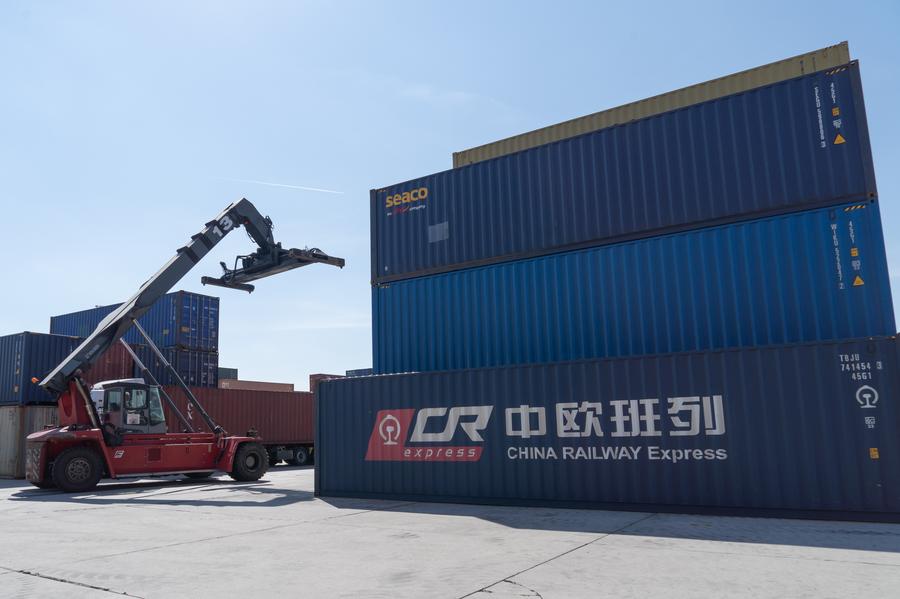Flight MU845 headed for Paris is set to depart Nanjing Lukou International Airport in Nanjing, east China's Jiangsu Province, late July 8, 2025. (Photo by Fang Tianxiang/Xinhua)
Admittedly, like all major economic players, China and the EU do not agree on everything. But disagreement does not equal confrontation. In fact, it is through dialogue that differences can be managed, and mutual interests enhanced.
by Xinhua writers Zhang Zhaoqing, Chen Binjie
BRUSSELS, July 24 (Xinhua) -- This year marks the 50th anniversary of diplomatic ties between China and the European Union (EU), a milestone in a relationship that has matured through dialogue, cooperation and mutual benefit.
As the international landscape grows increasingly fraught, the anniversary offers a timely reminder: China is a critical partner to Europe, not a systemic rival.
That distinction matters. Despite occasional disagreements, the relationship between China and Europe is underpinned by a wide range of shared interests, including trade, climate, and global governance. These areas of common ground should not be eclipsed by isolated points of friction.
From just 2.4 billion U.S. dollars in trade in 1975 to nearly 785 billion dollars in 2024, China-EU economic ties have become one of the most vibrant engines of global growth. Tens of thousands of freight trains have linked Chinese cities with over two dozen European countries. Investment flows have steadily expanded. Tourism, education, and people-to-people exchanges are flourishing. Such a relationship is not adversarial but essential.
Admittedly, like all major economic players, China and the EU do not agree on everything. But disagreement does not equal confrontation. In fact, it is through dialogue that differences can be managed, and mutual interests enhanced.
Some in Europe express concerns over so-called trade imbalances and follow Washington's talk of "de-risking" and "de-coupling from China." But such concerns often miss the broader picture.
The EU has long benefited from its trade with China, not only through exports of goods but through the access its businesses enjoy in a vast and evolving market. From luxury brands and automobiles to pharmaceuticals and engineering, European firms have built a strong presence in China.

A container of China Railway Express is seen at the Csepel Freeport Logistics Park in Budapest, Hungary on April 12, 2022. (Photo by Attila Volgyi/Xinhua)
Moreover, trade is not merely about goods. Services such as education, travel and tourism, where Europe enjoys clear advantages, have formed a growing and vital part of bilateral exchanges. Chinese tourists, students, and business travelers have made meaningful contributions to Europe's economy and cultural life.
China and Europe also share common principles. Both advocate for multilateralism, a UN-centered international system, and a multilateral trade regime with the World Trade Organization (WTO) at its core. Both support multipolarity and globalization. Both are committed to tackling climate change and development deficits -- real challenges that demand cooperation, not confrontation.
China, which does not seek dominance in global affairs, has never imposed its choices on Europe, nor has it blamed the EU for its domestic challenges. On the contrary, China has consistently supported a strong, united and strategically autonomous Europe. China firmly believes that Europe is a critical pole in a multipolar world and a key partner in promoting a more inclusive and just global order.
China's pursuit of high-quality development aligns naturally with Europe's goals of a green transition and renewed competitiveness. Despite differences on certain issues, China's door to Europe remains open. It will continue to expand cooperation in areas ranging from green development to digital innovation, and from AI governance to upholding a free and open world economy.
The significance of China-EU ties extends far beyond bilateral interests. Whether in green supply chains, creating joint technological standards, or climate governance, each area of cooperation sends a signal of hope and stability to a world in flux.
As global climate change think tank E3G rightly pointed out, China and the EU are clean-tech powerhouses and agenda-setters in global climate policy. Allowing geopolitical tensions or trade frictions to derail this cooperation would be a serious strategic mistake.
The relationship needs more trust, not suspicion; more bridges, not barriers. This requires a return to the original spirit of China-EU engagement based on mutual respect, mutual benefit and shared progress.
As former EU official Gerhard Stahl noted, framing China as a "systemic rival" has done more to fuel misunderstanding than to foster constructive engagement. China, one of Europe's most important partners, offers long-term predictability and enormous opportunity. The prospects for China-EU relations are brighter than ever.
(Editor: fubo )


